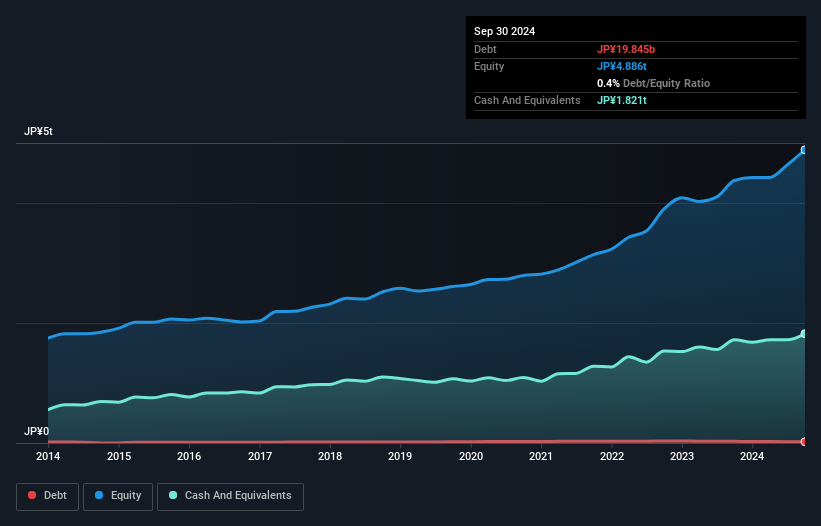Shin-Etsu Chemical (TSE:4063) Seems To Use Debt Quite Sensibly
Legendary fund manager Li Lu (who Charlie Munger backed) once said, 'The biggest investment risk is not the volatility of prices, but whether you will suffer a permanent loss of capital.' When we think about how risky a company is, we always like to look at its use of debt, since debt overload can lead to ruin. We can see that Shin-Etsu Chemical Co., Ltd. (TSE:4063) does use debt in its business. But the real question is whether this debt is making the company risky.
When Is Debt A Problem?
Debt assists a business until the business has trouble paying it off, either with new capital or with free cash flow. In the worst case scenario, a company can go bankrupt if it cannot pay its creditors. While that is not too common, we often do see indebted companies permanently diluting shareholders because lenders force them to raise capital at a distressed price. By replacing dilution, though, debt can be an extremely good tool for businesses that need capital to invest in growth at high rates of return. When we think about a company's use of debt, we first look at cash and debt together.
View our latest analysis for Shin-Etsu Chemical
What Is Shin-Etsu Chemical's Net Debt?
As you can see below, Shin-Etsu Chemical had JP¥19.8b of debt at September 2024, down from JP¥28.2b a year prior. However, its balance sheet shows it holds JP¥1.82t in cash, so it actually has JP¥1.80t net cash.

How Strong Is Shin-Etsu Chemical's Balance Sheet?
Zooming in on the latest balance sheet data, we can see that Shin-Etsu Chemical had liabilities of JP¥516.4b due within 12 months and liabilities of JP¥233.5b due beyond that. On the other hand, it had cash of JP¥1.82t and JP¥542.6b worth of receivables due within a year. So it actually has JP¥1.61t more liquid assets than total liabilities.
This surplus suggests that Shin-Etsu Chemical has a conservative balance sheet, and could probably eliminate its debt without much difficulty. Simply put, the fact that Shin-Etsu Chemical has more cash than debt is arguably a good indication that it can manage its debt safely.
On the other hand, Shin-Etsu Chemical's EBIT dived 14%, over the last year. If that rate of decline in earnings continues, the company could find itself in a tight spot. There's no doubt that we learn most about debt from the balance sheet. But ultimately the future profitability of the business will decide if Shin-Etsu Chemical can strengthen its balance sheet over time. So if you're focused on the future you can check out this free report showing analyst profit forecasts.
Finally, a company can only pay off debt with cold hard cash, not accounting profits. Shin-Etsu Chemical may have net cash on the balance sheet, but it is still interesting to look at how well the business converts its earnings before interest and tax (EBIT) to free cash flow, because that will influence both its need for, and its capacity to manage debt. Over the most recent three years, Shin-Etsu Chemical recorded free cash flow worth 51% of its EBIT, which is around normal, given free cash flow excludes interest and tax. This free cash flow puts the company in a good position to pay down debt, when appropriate.
Summing Up
While it is always sensible to investigate a company's debt, in this case Shin-Etsu Chemical has JP¥1.80t in net cash and a decent-looking balance sheet. So we don't have any problem with Shin-Etsu Chemical's use of debt. The balance sheet is clearly the area to focus on when you are analysing debt. However, not all investment risk resides within the balance sheet - far from it. For example - Shin-Etsu Chemical has 1 warning sign we think you should be aware of.
If you're interested in investing in businesses that can grow profits without the burden of debt, then check out this free list of growing businesses that have net cash on the balance sheet.
New: Manage All Your Stock Portfolios in One Place
We've created the ultimate portfolio companion for stock investors, and it's free.
• Connect an unlimited number of Portfolios and see your total in one currency
• Be alerted to new Warning Signs or Risks via email or mobile
• Track the Fair Value of your stocks
Have feedback on this article? Concerned about the content? Get in touch with us directly. Alternatively, email editorial-team (at) simplywallst.com.
This article by Simply Wall St is general in nature. We provide commentary based on historical data and analyst forecasts only using an unbiased methodology and our articles are not intended to be financial advice. It does not constitute a recommendation to buy or sell any stock, and does not take account of your objectives, or your financial situation. We aim to bring you long-term focused analysis driven by fundamental data. Note that our analysis may not factor in the latest price-sensitive company announcements or qualitative material. Simply Wall St has no position in any stocks mentioned.
About TSE:4063
Shin-Etsu Chemical
Provides infrastructure, electronics, and functional materials in Japan.
Excellent balance sheet, good value and pays a dividend.
Similar Companies
Market Insights
Community Narratives



